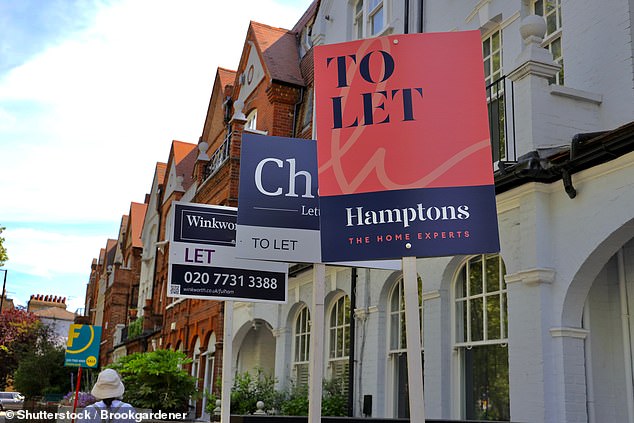Should real estate buyers and sellers put their plans on hold in the run-up to the elections – or should they move on?
For those looking to buy or sell a property, news of the July 4 general election may at first appear to derail their plans.
Elections usually lead to some slowdown in market activity, as buyers and sellers postpone their plans until they know what housing policies will be introduced by a new government.
They are also often followed by a ‘market boom’, where pent-up demand is released and everyone who has previously held back takes action.
However, like the surprise announcement of the election date itself, will the housing market react in a more unusual way this time?
Effects: Elections usually lead to some slowdown in market activity as buyers and sellers put their moving plans on hold
Some experts suggest there are factors that could have a much greater influence on buyers and sellers and the decisions they make – for example, the pace and size of interest rate cuts.
A predicted rate cut in the summer could prompt buyers to take action rather than wait for the outcome of the election.
We asked some leading housing market experts for their thoughts on the impact this election announcement will have on buyers and sellers.
Richard Donnell of Zoopla suggested it may well depend on how far along you are in the selling or buying process.
And then there’s the matter of personal circumstances and how motivated buyers and sellers currently are.
For example, you are a starter and want to stop paying record high rents.

Experts have suggested that the election will not have as big an impact on the housing market as in previous years
Mr Donnell said: “The announcement of the general election for July 4 comes earlier than expected. Elections normally lead to some stagnation in market activity.
“This general election period spans the early summer period when market activity tends to decline.
‘The housing market has recovered, with rising sales volumes and more homes coming up for sale, a sign of growing confidence among sellers, even though mortgage rates remain at 4.5 to 5 percent.
“There are 392,000 homes in the sales pipeline working their way to completion in 2024. This is 3 percent higher than this time last year and we don’t expect buyers to be pulling back on sales just yet.
“For many households, the urge to move remains, especially for first-time buyers escaping the rapid rent growth in the private rental sector and for ‘upsizers’ who postponed their move last year when mortgage rates rose.”
Postponing decisions
However, Mr Donnell said the election announcement could delay the sales process for some.
‘The election announcement is likely to slow the pace at which new sales are agreed in the coming weeks as we move towards the start of the summer slowdown. “Most buyers who are well into the home buying process and close to agreeing on a sale ideally want to go ahead and agree to the sale now,” he said.
Overall, we don’t think the elections will have as big an impact as in previous years
“Those who are earlier in the process will decide to postpone decisions until the fall after the election is over.
‘Overall, we don’t think the election will have as big an impact as in previous years, mainly because there isn’t a huge gap in policy between the two main parties and little detail on housing other than a focus on the reform of the private rental sector. sector and stimulating the housing supply.
‘However, the rounding of sales in 2024 may now be slightly lower than the 1.1 million we expected for 2024.
‘What businesses and landlords from all political parties will want to see are concrete plans for how we can boost housing supply across all rental sectors while implementing the right reforms in the private rental sector to ensure we maintain supply while can offer tenants more protection.’

Factors such as the pace and size of Bank of England rate cuts are likely to have a greater impact on the housing market
Meanwhile, Kate Eales of estate agents Strutt & Parker suggested the election’s declaration could be met with a sigh of relief.
She said: “The news that the general election is just six weeks away should be received by the market with a sigh of relief rather than a sigh of panic.
The news that the general election is just six weeks away should be received by the market with a sigh of relief rather than a sigh of panic.
‘The small warning window leaves little time for additional uncertainty or nervousness, and is good news for people looking to sell quickly, especially if they have deadlines to meet, such as the September school year or a new job.
“Those who have adopted a ‘wait and see’ attitude can now move forward with confidence as regardless of the election outcome, the rest of the year will deliver a busy market fueled by those who sat on their hands and a more buoyant economy.
‘Positive inflation figures and mortgage lenders taking into account expected falls in interest rates have already created a busier market in recent weeks, with renewed motivation and confidence from both buyers and sellers.’
Post-election backlash
And Rightmove’s Tim Bannister agreed it was likely the summer election would have less impact than if an election were held in the autumn.
He said: ‘A look back at recent elections shows that house prices and activity tend to remain stable in the run-up to the event, and then we often see a rebound post-election.
‘It takes an average of more than seven months and we still see the pent-up demand from last year flowing into 2024.
‘This means that for many, the desire to continue moving is likely to outweigh waiting to see what new policies the government might introduce.
“Elections in the summer, when the market is traditionally slower, could have less impact on housing market activity than if elections were held in the fall.
‘So as we head towards this election, the housing market will likely remain active, with activity picking up once the election is over and things become clearer.
“It could mean we’re setting ourselves up for a stronger-than-normal August, especially if we see interest rates finally starting to fall.”

According to experts, elections in the summer, when the market is traditionally slower, could have less impact on housing market activity than if elections were held in the fall.
Meanwhile, Lucian Cook, of estate agent Savills, suggested that issues such as affordability and interest rate cuts are much more likely to have a major impact on the market.
He said: ‘Affordability is by far the biggest factor in the mainstream housing market.
‘Accordingly, we expect the pace and scale of rate cuts to have a greater impact on the market than the timing or outcome of the general election, not least because of the slim chances of a change of government.
‘The fall in headline inflation to 2.3 per cent in the year to April signals two or three cuts to the base rate by banks this year.
‘That is likely to mean that mortgage markets will remain relatively stable in the short term, with the prospect of lower borrowing costs as the year progresses.
Perhaps the biggest impact of the July general election is the prospect that the Renters Reform Bill will struggle to pass before Parliament is dissolved.
‘And with the run-up to the general election shorter than expected, buyer demand is more likely to gain momentum in the autumn once most of the uncertainty is behind us.’
A recent survey by Savills shows there is ‘a degree of ambivalence towards the prospect of an election’, Mr Cook said.
A total of 79 percent of respondents said this had no impact on their commitment to moving in the next twelve months.
Mr Cook added: ‘WAlthough a change of government is unlikely to materially change the macroeconomic backdrop, current evidence suggests that this would result in a change in the focus of housing delivery and planning, with Labor setting out its ambition to drive the coming to deliver 1.5 million homes in five years. high on the political agenda for years.
‘While this has the potential to change the housing landscape over time, it is unlikely to have a significant impact on the market in the short term.
‘From a policy perspective, perhaps the biggest impact of the July general election is the prospect that the Renters Reform Bill (currently in the House of Lords committee stages) will struggle to pass before Parliament is dissolved.
‘However, with both parties calling for reform in this area, it remains a matter of when, not if, we see the abolition of the Assured Shorthold Tenancy in England and Wales, with the key issue being the way in which new regulations are introduced and the balance between protecting the interests of landlords and tenants.
‘In that regard, much attention is likely to be paid to the potential impact on the availability of rental properties in an already under-biased market.’

